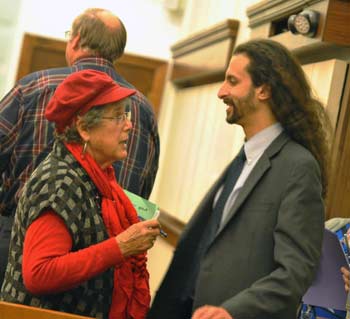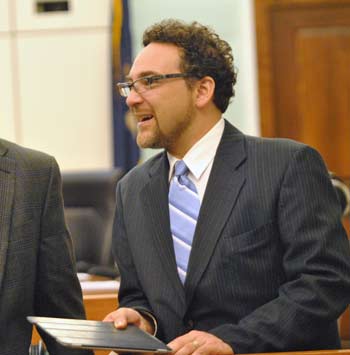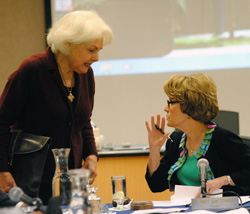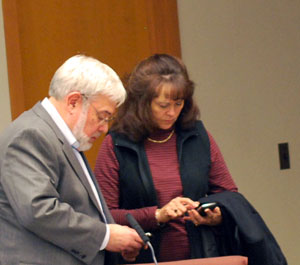Washtenaw County board of commissioners meeting (Nov. 7, 2012): A long post-election meeting included several debates with an impact on county finances.

Washtenaw County commissioners Barbara Bergman and Yousef Rabhi at the Nov. 7 county board meeting. Rabhi usually wears his hair tied back, but he let it down at the beginning of the meeting to announce a plan to raise money for local shelters – he’s collecting pledges for each inch he cuts off. (Photos by the writer.)
Taking another step toward addressing a year-long controversy over how much to pay for animal control services, the board authorized contracting with the Humane Society of Huron Valley for $500,000 annually. The action enables the administration to negotiate a contract with HSHV for up to four years, with the option of adjusting the amount based on changes to the taxable value of property in the county. Voting against the resolution were Dan Smith, Wes Prater and Rolland Sizemore Jr. Ronnie Peterson was absent.
The county would not likely pay that entire amount. There are preliminary commitments from five municipalities with their own animal control ordinances, to help the offset the cost of the HSHV contract. Those entities are the cities of Ann Arbor and Ypsilanti, Ypsilanti Township, Pittsfield Township, and Superior Township.
Several commissioners expressed concern that the county is essentially in the same position as it was when this process began. Wes Prater objected to the fact that the county’s procurement policy wasn’t being followed, because a request for proposals (RFP) wasn’t issued. Ultimately, a sufficient number of commissioners agreed to back the resolution, giving it final approval. The contract itself will not require authorization by the board.
In another move related to animal control services, the board gave final approval to a civil infractions ordinance, giving the county more flexibility to designate violations of other county ordinances as a civil infraction, rather than a criminal misdemeanor. [.pdf of proposed ordinance] In the context of animal control, enforcement of the county’s dog licensing ordinance is low because the current penalty – a criminal misdemeanor of 90 days in jail or a $500 fine – is relatively harsh. The idea is that enforcement would improve if a lesser civil infraction could be used.
Commissioners also debated options for changing their own compensation, ultimately giving initial approval to boost their base salaries from $15,500 to $15,750 annually and replacing per diem payments with stipends, effective Jan. 1, 2013. An amendment by Yousef Rabhi also increased the pay for chairs of the ways & means committee and the working session – bringing them to the same level as the board chair, at $3,000 more annually than the base salary of other commissioners. Voting against the changes as amended were Dan Smith and Rolland Sizemore Jr. A final vote is expected at the board’s Dec. 5 meeting, when a final vote on the overall 2013 budget will also occur.
In non-budget items, Dan Smith brought forward a resolution to rescind the board’s previous support for a regional transit authority (RTA) that’s being proposed in Lansing. The RTA would include the city of Detroit and the counties of Washtenaw, Wayne, Oakland and Macomb. Conan Smith has been an advocate for that effort, both as chair of the county board and in his role as executive director of the Michigan Suburbs Alliance. During deliberations on the item, some commissioners criticized Conan Smith for acting on behalf of the board and not keeping them fully informed. Wes Prater felt Conan Smith’s actions reflected disrespect for other commissioners – but Smith said he meant no disrespect.
A sense of disrespect was also felt by a resident who attended the Nov. 7 meeting to advocate for the county’s help in establishing a daytime warming center for the homeless. Alexandra Hoffman chastised the board because no commissioner responded to commentary about a warming center, and instead the remarks by advocates for the center had been followed by “disturbingly lighthearted talk about haircuts.”
Hoffman was referring to an announcement earlier in the meeting by Yousef Rabhi, whose hair is longer than any other commissioner, male or female. He hopes to get donations of $500 for every inch he cuts, to raise money for three local nonprofits: Shelter Association of Washtenaw County, Interfaith Hospitality Network, and SafeHouse Center. Rabhi told Hoffman that he was simply trying to raise awareness and money for the same issues that the warming center advocates supported.
The meeting fell the day after the Nov. 6 general election, which had resulted in the defeat of two of the nine commissioners who were running for re-election: Republican Rob Turner and Democrat Wes Prater. In District 1, Turner was outpolled by Democrat Kent Martinez-Kratz, decreasing the number of Republicans on the future nine-member board from three to two. Republican Alicia Ping won the District 3 seat over Prater – as the two incumbents faced each other due to redistricting that took effect with this election cycle. The last meeting for Turner and Prater – as well as for Democrats Leah Gunn and Barbara Bergman, who did not seek re-election – will be on Dec. 5.
It’s likely that the new board, which takes office in January, will eventually deal with a controversial topic that was raised during an appointments caucus on Nov. 7: Possible consolidation of the Washtenaw County road commission with county operations. During the caucus, held immediately prior to the regular meeting, Conan Smith suggested not yet reappointing the one road commissioner, Doug Fuller, whose term is expiring – though Fuller will continue to serve. Smith wanted to give the new county board some flexibility in discussing the future of the road commission. Some of the other issues emerging during the appointments caucus related to the role of the county’s historic district commission, economic development corporation, and the criminal justice community collaborative. [Full Story]









